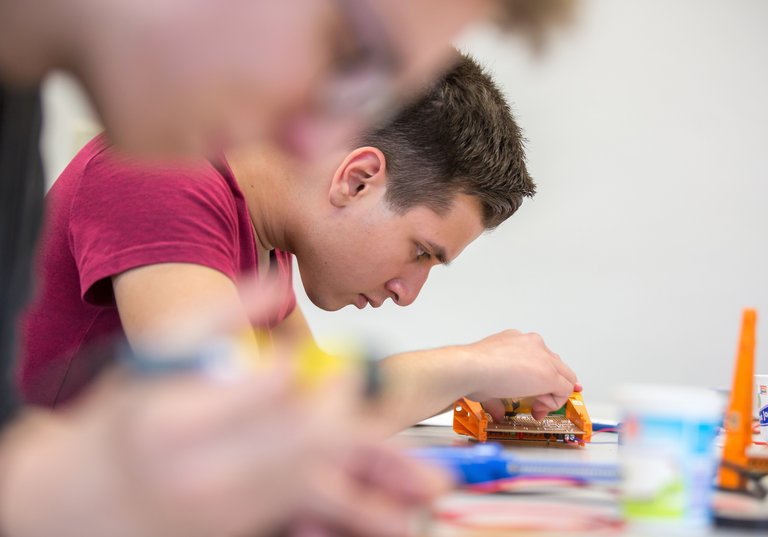The TU Ilmenau was successful twice in the newly launched federal-state programme "Strengthening university teaching through digitalisation". On the one hand, it received funding for the "examING" project to develop and test digital examination content, formats and associated digitally supported examination systems, particularly for Bachelor's degree courses in engineering. On the other hand, a joint project "CrossLabs" is being funded together with the TU Freiberg, the TU Dortmund and the NORD-AKADEMIE, in which virtual laboratory environments or simulations are being developed and made available for cross-university use.
Strengthening teaching through digitisation: TU successful with individual and joint application

Digital teaching and learning formats are an integral part of modern university teaching. With both projects, we want to give further impetus to this development and thus contribute to the attractiveness of TU Ilmenau as a modern place to study," says the Vice President for Studies and Teaching, Professor Anja Geigenmüller.
The federal-state programme "Strengthening university teaching through digitisation" was launched in November 2020 against the backdrop of the Corona crisis. The programme's sponsor is the newly established Federal Foundation "Innovation in Higher Education Teaching", which was also responsible for reviewing the projects. Of a total of more than 260 applications, 139 projects were recommended for funding after extensive scientific evaluation. The projects at the TU Ilmenau will be funded for a period of three years with 2.6 million Euros for the project "examING" and proportionally with one million Euros for the project "CrossLabs".
The Vice President for Studies and Teaching at the TU Ilmenau is in charge of the overall project. The faculties are responsible for developing the content of the engineering examination formats for Bachelor students. The didactic and technical support structures are located at the Central Institute for Education, at the University Computer Centre of the TU Ilmenau and at the Chief Information Officer. Students and all other university stakeholders involved in the processes of learning, teaching and examining will be involved in all project phases.
Further development of digitally supported examination formats
Due to the Corona pandemic, learning, teaching and examination had to be rethought at the university and technical systems such as the Moodle learning management platform and the associated "examination Moodle" had to be expanded and further developed. These valuable experiences are to be used to further develop digitally enriched university teaching. Digital formats offer numerous advantages, such as a more flexible learning environment that can be better adapted to individual learning needs. However, it also poses new challenges for teachers and students: Digital tools should not restrict or even trivialise the transfer of knowledge, either in terms of content or structure.
Different stages of knowledge acquisition from the first to the last semester must also be adequately reflected in the chosen form of examination," says Prof. Geigenmüller.
The acquisition of knowledge, skills, insights and experience must be examined in a competence-oriented manner. A mere knowledge test does not do justice to the complexity of university learning. For this reason, various teaching contents in lectures, projects and seminars must be compared with suitable, digital examination methods, which appropriately test the acquired competences in problem analysis, development of solution strategies, reflection on alternative solutions, etc.
While there are already several approaches to this in the social sciences, for example, they are largely lacking in the engineering sciences. In engineering courses, knowledge is transferred by means of mathematical principles, formulas, drawings, program codes or technical drawings. Students must know and be able to apply methods for solving problems. In addition to technical competencies, interdisciplinary competencies such as cooperation and communication also play an important role. However, there is a lack of examination formats and systems for a digital examination of specific engineering study contents. The aim of the "examING" project is therefore to create formats and systems for competence-oriented digital examination in the engineering sciences.
The results and the examING tools for the design of digitally supported competence-oriented examinations in the engineering bachelor's degree programs at TU Ilmenau are to be applied university-wide in various contexts and transferable to other universities after project completion.

New tools for digitally supported audits
To this end, the project will first analyse various forms of examination. The analysis is based on the principles of constructive alignment: According to this concept, learning objectives, teaching and learning methods, and forms of examination must be aligned with each other, as must spatial and temporal conditions and the availability of teaching media and resources. It is not so much a question of whether face-to-face or online examinations are "better". Rather, the synthesis of analogue and digital forms of examination should produce synergy effects that make the examination system at the TU Ilmenau more student-centred, more flexible and thus more attractive.
Technological infrastructure plays a key role
In order to achieve the goals of the project, four implementation modules were designed. In module 1, the didactic skills of teachers are expanded with regard to a competence-oriented examination practice, i.e. one that is tailored to the study progress of the students. On this basis, the comprehensive analysis and coordination of teaching content and examination methods will be developed. Module 2 comprises the creation of the necessary infrastructure. In the course of the project, one lecture hall is to be set up as an e-examination lecture hall by equipping every second lecture hall chair with a 230 V socket, a USB charging connection and a LAN network socket. Furthermore, the room will be equipped with ten additional WLAN access points. In parallel, digital engineering examination forms will be developed and tested in Module 3 and accompanying support structures will be established in the 4th implementation package.
This will make it possible, for example, for all students in the interdisciplinary, joint basic engineering studies at TU Ilmenau to take hybrid or synchronous online exams on site," says project manager Prof. Anja Geigenmüller.
Makerspace Lab for practical applications
One component of the project is the creation of a so-called Makerspace learning environment. As the name suggests, a Makerspace enables practical work on a project. The theoretical knowledge acquired in various subjects is applied in such a way that the interrelationships between the disciplines, such as computer science and design engineering, become more comprehensible to the students. In this way, students acquire important core competencies for the job description of an engineer, such as solution-oriented and cross-disciplinary thinking and acting. This real learning environment is to be enriched by suitable, digital forms of teaching and examination, for example in the context of the preparation of projects in the Makerspace or also in the examination of acquired competences.

Joint project Crosslabs: Learning and Working 4.0
With the development of digitally supported examination formats, the examING project is also closely interlinked with the joint project "Flexibly combinable cross-reality labs in university teaching: sustainable competence development for learning and working 4.0" (CrossLabs). In this project, which is also funded under the programme line "Strengthening university teaching through digitisation", TU Bergakademie Freiberg, TU Ilmenau, TU Dortmund University and NORDAKADEMIE University of Applied Sciences are collaborating on the development of cross-university CrossLab modules.
CrossLab is a collective term for digital formats of laboratory education such as remotelabs or virtual laboratory environments. The central difference between a conventional and a cross-reality laboratory is the connection of the various experiments, for example from computer science, mechanical engineering or chemistry, to a web interface to enable remote access. Here, the computer equipment and embedded systems must ensure secure access so that the experiment is not compromised and, in the worst case, a machine can be destroyed. Furthermore, user administration and scheduling is required, since the real experiments can only be executed by one user at a time. The remote laboratory GOLDi, which exists at the TU Ilmenau, also offers simulation of the real experiments to enable parallelization and intensive preparation before a work result is checked on the real experiment.
(Kopie 8)
Joint project for cross-university networking
Although the potential for cross-university use of CrossLabs is obvious, they have so far remained isolated at the university level. Despite content overlaps, the fixed installations, which were tailored to the didactic requirements at one location, cannot easily be used from another university. The joint project now aims to establish a cross-university, interdisciplinary network of digitized laboratory modules that can be combined as needed in a learning environment for student-centered teaching, comparable to the concepts of Industry 4.0. To this end, the partners will develop and evaluate solutions at the didactic, technical and organizational levels.
The TU Ilmenau is entrusted with the technical analysis and the development of a new software architecture in the project. The Ilmenau project leader and head of the Computer Science for Engineers teaching group at the TU Ilmenau, Dr.-Ing. Detlef Streitferdt:
We will redesign the software architecture for a remote lab in Ilmenau based on our Remotelab GOLDi. The new software architecture should be able to integrate other remote labs across locations, so that eventually there will be a remote lab whose individual experiments can originate from different, globally distributed partners without a user noticing.
Digital support for laboratory training
In the future, for example, it will be possible to use a microcontroller from Freiberg to control an elevator model in Ilmenau and thus use the equipment of both universities. The resulting synergies will multiply the applications and development possibilities for remote laboratory-supported digital education formats. Specifically, according to Professor Streitferdt, the preparation phase for new and supplementary classroom formats can be significantly improved in the future. "After short lecture phases, online preparation can make the following presence portions very efficient, as it is then a matter of linking and applying what has been learned. In these attendance phases, students and lecturers can interactively discuss and further develop assignments." In addition, global availability means that the best courses can be integrated into courses in order to improve their quality. Finally, remote labs allow students to schedule their time almost freely 24 hours a day, seven days a week.
The total funding volume for the joint project amounts to 4.7 million euros for a period of three years. Of this, more than one million euros in project funding will be allocated to TU Ilmenau.
Contact
Prof. Anja Geigenmüller
Vice President for Studies and Teaching, Project leader examING
Dr.-Ing. Detlef Streitferdt
Head of the Computer Science for Engineers teaching group, Project leader TU Ilmenau in the CrossLabs joint project

